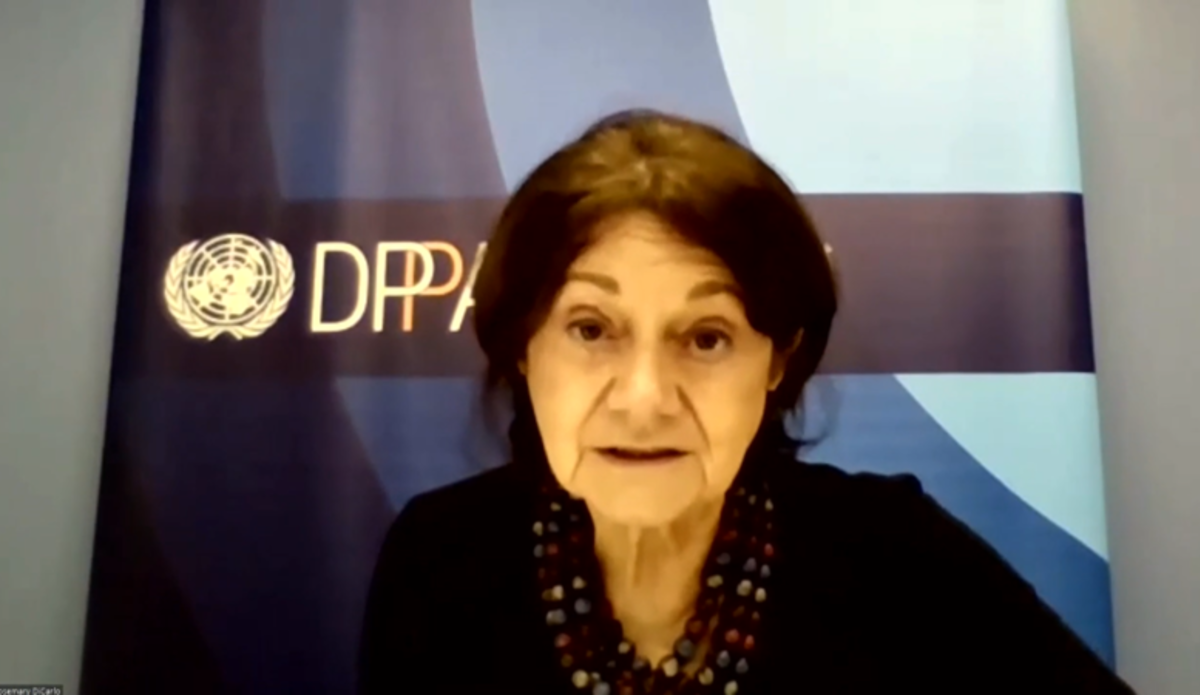Mr. Chairman,
Excellencies,
Ladies and gentlemen.
It is a pleasure for me to address this special meeting of the Peacebuilding Commission. I am pleased to welcome Ms. Sima Bahous, newly appointed Executive Director of UN Women, and I am looking forward to working together in advancing the Women, Peace and Security Agenda.
We last gathered a year ago to mark the 20th anniversary of Security Council resolution 1325. A growing number of Member States have taken positive steps towards the objectives of the women, peace and security agenda since then. The work of women-led and women-focused organizations continues to inspire us. However, implementation gaps persist.
Slow progress in enhancing women’s role in peacebuilding and sustaining peace represents a major barrier to realizing the promise of the agenda. We have witnessed many political and peace processes that produced poor results because women were excluded from the negotiating table. This must change.
At the Department of Political and Peacebuilding Affairs (DPPA), we are determined to continue to seize opportunities to promote women’s full, equal and meaningful participation in peace and political processes and support gender-sensitive peacemaking and peacebuilding.
I would like to emphasize four areas of our work that are particularly relevant to today’s discussion.
First, we are constantly improving gender analysis to guide our work. Almost all special political missions included language highlighting gender issues and women’s role in their reports submitted to the Security Council. Eighty-eight per cent of them included recommendations on women, peace and security, a target that has been increasing gradually from 63 per cent in 2017. We also track gender-sensitive analysis as part of DPPA’s Strategic Plan’s results framework. Members of the Peacebuilding Commission have a role to play in further strengthening gender analysis in substantive discussions and outcome documents of the Commission.
Second, we not only support efforts to expand special measures for women, such as quotas, but also focus on the quality of women’s participation in political and peace processes, and peacebuilding initiatives. From Colombia to Syria and Yemen, we are exploring new pathways for participation through digital inclusion strategies and virtual consultations and engagement. In Sudan, the UN has supported women's participation in the peace talks between the Government of Sudan and SPLM-N in Juba, and secured the presence of gender experts inside the negotiation room. In Central Asia, our Regional Centre (UNRCCA) recently launched the first-ever caucus of women political leaders in the region. This informal coalition works towards promoting the role of women in supporting regional peace and security as well as advancing sustainable development. In Niger, the Peacebuilding Fund has supported local peace structures across 60 villages, mostly led by women mediators, seeing the peaceful resolution of local conflicts between farmers and herders.
In this regard, I am encouraged to see that PBC’s gender strategy and action plan led to creating space for women to share their experiences and make recommendations on the way forward. The presence today of civil society and academia representatives is a clear demonstration of that commitment.
Third, we are doing more to connect the dots between women’s participation and protection needs. Conflict-related sexual violence is a major challenge that deserves our attention. Similarly, we must address other forms of widespread gender-based violence and discrimination that specifically target women political activists, peacebuilders, and human rights defenders, particularly in conflict-affected environments. This becomes even more crucial with the COVID-19 pandemic exacerbating the very issues the Women, Peace and Security agenda was designed to address.
It is timely that the Peacebuilding Fund’s Gender and Youth Promotion Initiative (GYPI) has recently allocated a total of $19.2 million to protect women and youth peacebuilders and human rights defenders. It is also aligned with the Secretary-General’s Call to Action for Human Rights.
Fourth, we are advocating for adequate, predictable, sustained funding for women’s political participation. The Peacebuilding Fund sets a powerful example: For the third consecutive year the Fund allocated 40% of its annual investment towards gender equality and women’s empowerment. DPPA’s Multi-Year Appeal also dedicates at least 17% of its funding to projects entirely devoted to the Women, Peace and Security Agenda.
Today, we will hear stories that demonstrate the urgent need to make long term, flexible funds available to women peacebuilders. These examples are crucial as we prepare for the High-Level General Assembly Meeting on financing for peacebuilding next year.
Mr. Chairman,
We are alarmed over a deteriorating situation in Afghanistan, especially for women and girls. The UN has been supporting Afghan institutions and civil society to enhance women’s meaningful participation in Afghanistan’s political life, including the peacebuilding agenda. In 2015, Afghanistan adopted its first National Action Plan to implement Security Council Resolution 1325. UN colleagues in Afghanistan have been intensively engaged in supporting this process.
We must protect these gains. Therefore, we will continue appealing to the de facto authorities to fulfill their obligations under international law, including human rights and humanitarian law. Women must be able to continue to move freely, work and study. Girls must have the right to effective access to all levels of education.
Mr. Chairman,
There are no quick fixes to entrenched power politics, patriarchal attitudes and unequal social structures. We know that much more needs to be done, and we are committed to doing our part in enhancing women’s meaningful participation in public life.
In doing so, we will be guided by the report of the Secretary-General on Our Common Agenda, which renews our commitment to placing women and girls at the center of UN activities.
We need more women leaders to sustain peace. I encourage you to continue to amplify the voices of women peacebuilders, and to support their efforts. I look forward to hearing from all of you how we can continue to work together to make that happen.
Thank you.

